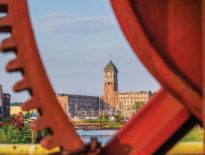
W. Bart Lloyd
One of the beautiful things about free markets is their natural anti-bombast shields. No matter how loud political would-be manipulators on both sides of the aisle rant, markets get things right sooner or later.
We are now turning that corner with respect to climate change, and business has an important role to play in breaking through the bombast.
Let’s start by appreciating the danger. Climate change is already having real world impacts on coastal property prices, where recent studies have shown measurable losses in value. Flood zone properties are next in line. It is also having real world impacts on the casualty insurance business – not just with coastal storms, but also with wildfires, tornadoes and wind events. These two combined will have an impact on the banking business.
Meanwhile, think tanks such as the Brookings Institution are projecting significant meta-impacts on growth and GDP, like a 20 percent reduction in America’s GDP by 2100 due to climate change consequences. Even Pinkerton is now seeing the upheaval and need for security as business opportunity, The New York Times reported.
At bottom, the worst thing for capitalism is uncertainty. It makes it hard to invest with any appreciation of the risks involved, resulting in higher costs of capital at every level (uncertainty is, by one renowned report, why capitalism hasn’t worked as well in developing countries). Climate change portends uncertainty at a scale we’ve never known before.
)Fossil Fuels Are Too Cheap
The culpability of the fossil fuel industry in promoting a patently false diversionary narrative is well-documented and doesn’t need to be recounted here.
What is new is the culpability of the political left, in promoting a “Green New Deal” – a social restructuring program masquerading as an environmental program. It is just as patently false a diversionary narrative as the fossil-fuel one, and just as dangerous a one if allowed to suck up the oxygen in the room. These are the political impediments that need to be overcome.
The anti-bombast answer is in fact a market one. The engine driving our debilitating addiction to fossil fuels is that they are too cheap. The cost to our society of cleaning up the climate mess that fossil fuels create has been externalized. We need to use the market to internalize it.
The concept is simple and easily accessible – the social and environmental costs of using carbon as a fuel, like the costs of downstream water pollution 40 years ago, has been externalized from the producer/user to the general public. Fining polluters was the water-pollution solution 40 years ago.
The modern market solution – re-pricing carbon and adding to it a fee to internalize these costs – is far from new. The Canadian province of British Columbia has been at it since 2008, with no loss of economic activity, jobs or industry. The Wall Street Journal on Jan. 16 ran a letter singed by 3,500 economists stating that a carbon fee is the most cost-effective way to reduce carbon emissions at scale and speed
How You Can Help
Happily, we have a bill. Introduced with bipartisan support in the U.S. House of Representatives and sponsored by the Citizens Climate Lobby, The Energy Innovation Act (HR 763) proposes a fee on carbon that is remitted to citizens as a dividend.
Importantly, this not a tax – it is a surcharge that internalizes the externalized costs. It doesn’t send money to the Treasury, it creates a trust fund that redistributes it to citizens on a per capita basis.
The preliminary result will be some cash dividend to citizens. The long-term result will be that carbon–based fuels are more expensive, and wind, solar and other renewable sources will be more economically competitive. Jobs in these industries will be created. The battleship will start to turn. This is what British Columbia is already experiencing.
In order for this important, sensible and feasible initiative to proceed, businesses need to stand up and be counted – and soon.
We have a tough slog in front of us – in particular with a Senate majority leader from a coal–producing state. The only way we win that battle is with businesses joining the chorus, writing their senators and representatives. The Citizens Climate Lobby website makes that easy.
There is a tendency in the business world to draw a bright line on certain political issues as off limits to business interests. They seem so much more appropriately the subject of personal opinion and expression. That is no longer the case with climate change. It’s everyone’s issue now.
W. Bart Lloyd is an attorney and advocate specializing in the business side of affordable housing in Boston.




 |
| 
